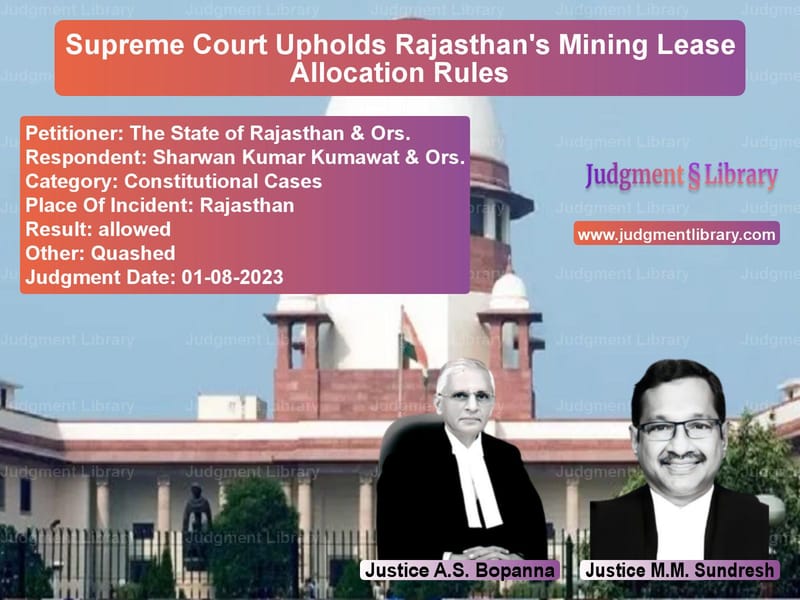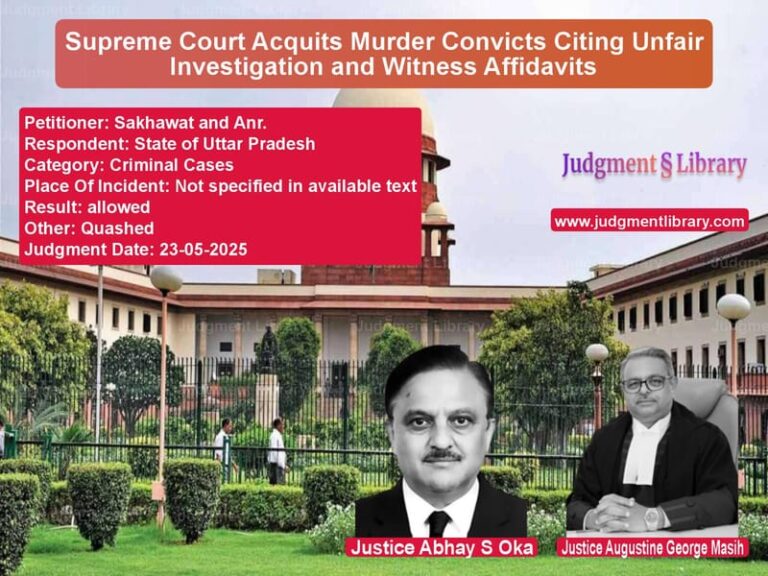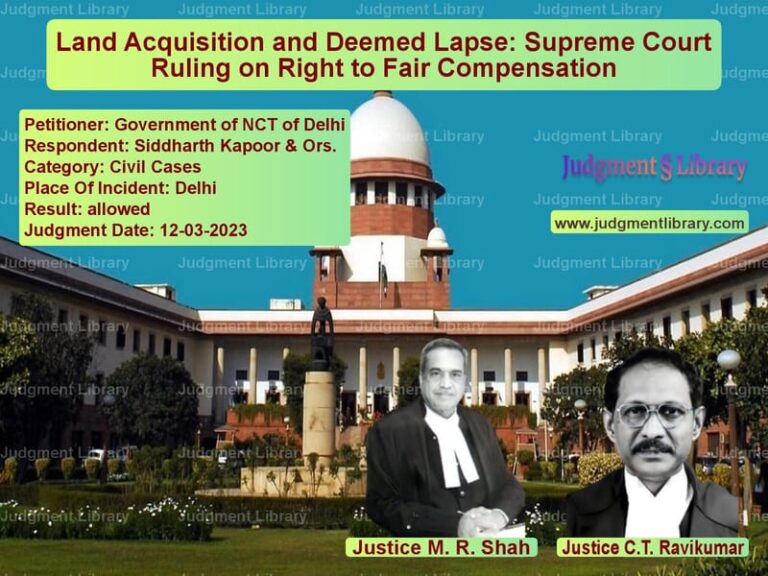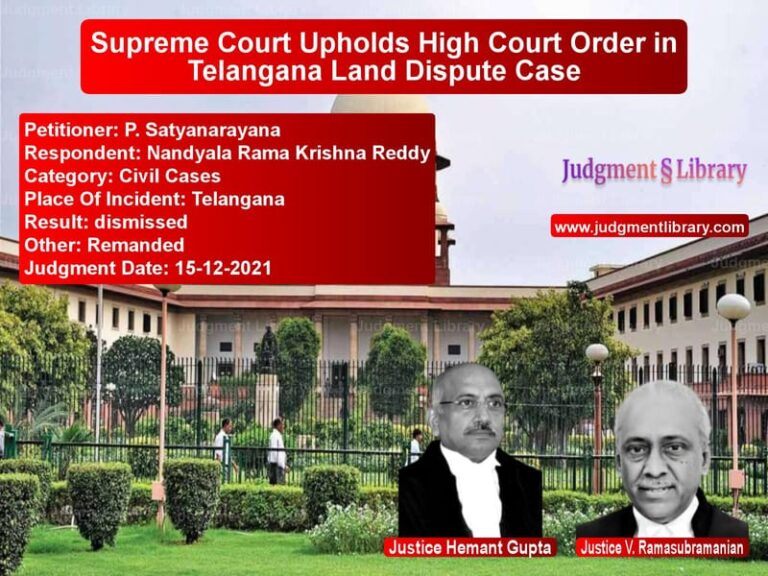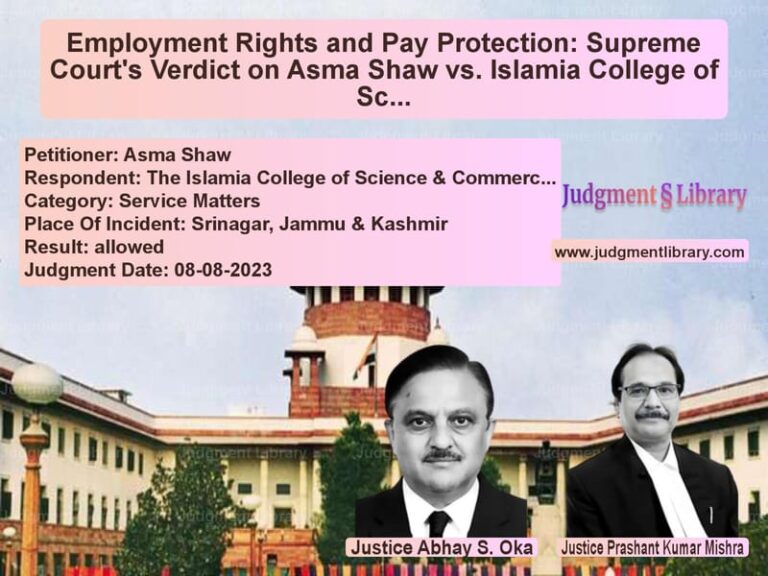Supreme Court Upholds Rajasthan’s Mining Lease Allocation Rules
The Supreme Court of India, in the case of The State of Rajasthan & Ors. v. Sharwan Kumar Kumawat & Ors., delivered a landmark ruling regarding the allocation of mining leases in Rajasthan. The Court upheld amendments made to the Rajasthan Minor Mineral Concession Rules, 1986, which introduced a system of delineation and auction for mining leases in government land. The decision overturned the Rajasthan High Court’s earlier ruling that had declared certain provisions unconstitutional.
Background of the Case
The case revolved around the allocation of mining leases for minor minerals in Rajasthan. The amendments to the Rajasthan Minor Mineral Concession Rules, 1986, introduced new procedures for granting leases, including an auction-based system and reservations for specific categories of applicants.
The key events leading to the litigation are as follows:
- January 28, 2011: The Rajasthan government amended the mining rules, introducing a requirement that mining leases in government land (excluding marble and granite) could only be granted through delineation and auction.
- April 3, 2013: Further amendments were made, rejecting all pending applications filed before January 27, 2011, unless they were filed under preferential categories.
- 2013-2015: Several applicants challenged the new rules, arguing that their pending applications should be considered under the previous “first-come, first-served” system.
- 2016: The Rajasthan High Court declared sub-rule (10) of Rule 4 and sub-rule (3) of Rule 7 unconstitutional, directing the revival of pending applications.
- August 1, 2023: The Supreme Court overturned the High Court’s ruling, upholding the validity of the amendments.
Key Legal Issues Considered
- Whether the Rajasthan government’s amendments were legally valid and consistent with the Mines and Minerals (Development and Regulation) Act, 1957.
- Whether the rejection of pending applications violated the principle of “legitimate expectation” for applicants.
- Whether the High Court had exceeded its jurisdiction by declaring the amendments unconstitutional.
Arguments by the Appellants (State of Rajasthan)
The Rajasthan government, represented by Senior Advocate Dr. Manish Singhvi, argued:
- The amendments were introduced to bring fairness and transparency to the mining lease allocation process.
- The previous “first-come, first-served” system led to irregularities and favoritism, necessitating a shift to an auction-based system.
- Pending applications had no vested rights, and the government had the authority to change policies in the public interest.
- The High Court erred in ruling that applicants had a right to leases based on old rules.
Arguments by the Respondents
The applicants challenging the amendments, represented by Advocates Ms. Shobha Gupta and Ms. Ankita Gupta, contended:
- The amendments unfairly rejected applications that had been pending for years.
- Many applicants had made financial investments and expected their applications to be processed under the old rules.
- The Rajasthan government acted with “legal malice” by introducing rules that nullified the High Court’s earlier decisions.
- The amendments violated the principles of “legitimate expectation” and “natural justice.”
Supreme Court’s Analysis and Judgment
1. No Vested Right in Pending Applications
The Court reiterated that applicants do not have a fundamental or vested right to a mining lease:
“A mere filing of an application does not create any right. The power of the Government to amend the rules is independent, and pending applications do not come in the way of such policy changes.”
2. Auction-Based System is Justified
The Court upheld the auction-based allocation system as a means to promote transparency and efficiency:
“When a decision is taken in public interest to evolve a better process such as auction, any existing right of an applicant evaporates on its own.”
3. High Court’s Overreach
The Supreme Court criticized the High Court for exceeding its jurisdiction in declaring the amendments unconstitutional:
“The High Court’s ruling ignored the fact that policy decisions related to mining leases fall within the executive domain. Courts cannot interfere with such decisions unless they are arbitrary or illegal.”
4. Legitimate Expectation Does Not Apply
The Court clarified that the principle of “legitimate expectation” cannot be used to challenge changes in government policy:
“Personal benefit must give way to public interest, and the doctrine of legitimate expectation cannot block policy changes intended for transparency and efficiency.”
5. No Legal Malice
The Court rejected the argument that the amendments were introduced to nullify previous judicial decisions:
“The amendments were enacted to introduce a fairer system, and there is no evidence of legal malice. The government has the right to change policies in the public interest.”
Supreme Court’s Final Decision
The Supreme Court ruled:
- The Rajasthan government’s amendments to the mining lease rules are valid.
- Pending applications do not create a vested right, and the government is free to adopt a new system.
- The auction-based system is legally sound and ensures fairness in lease allocation.
- The High Court’s ruling is overturned, and the amendments are upheld.
Conclusion
This ruling reinforces key legal principles:
- No vested right in pending applications: Applicants cannot claim entitlement to a mining lease based on old rules.
- Government policy changes are valid: The state has the authority to modify mining rules to ensure transparency.
- Judicial restraint is necessary: Courts should not interfere with policy decisions unless they are arbitrary or illegal.
The judgment ensures that the mining lease allocation process in Rajasthan remains fair, transparent, and in line with national mining policies.
Petitioner Name: The State of Rajasthan & Ors..Respondent Name: Sharwan Kumar Kumawat & Ors..Judgment By: Justice A.S. Bopanna, Justice M.M. Sundresh.Place Of Incident: Rajasthan.Judgment Date: 01-08-2023.
Don’t miss out on the full details! Download the complete judgment in PDF format below and gain valuable insights instantly!
Download Judgment: the-state-of-rajasth-vs-sharwan-kumar-kumawa-supreme-court-of-india-judgment-dated-01-08-2023.pdf
Directly Download Judgment: Directly download this Judgment
See all petitions in Constitution Interpretation
See all petitions in Public Interest Litigation
See all petitions in Legislative Powers
See all petitions in Judgment by A. S. Bopanna
See all petitions in Judgment by M.M. Sundresh
See all petitions in allowed
See all petitions in Quashed
See all petitions in supreme court of India judgments August 2023
See all petitions in 2023 judgments
See all posts in Constitutional Cases Category
See all allowed petitions in Constitutional Cases Category
See all Dismissed petitions in Constitutional Cases Category
See all partially allowed petitions in Constitutional Cases Category

